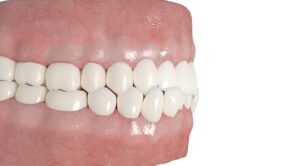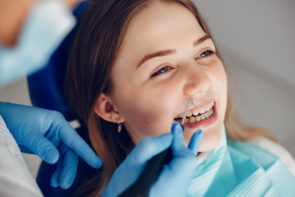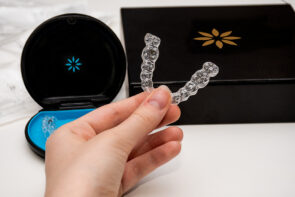
While many are concerned about the aesthetic issues that come with a crossbite, it's a dental condition that can have far-reaching implications on your oral health. Traditionally, braces are known to correct a crossbite in numerous cases. But with modern technology, many were led to wonder: Can Invisalign fix crossbite?
What is a Crossbite?
A crossbite is a type of malocclusion, or misalignment, where the upper and lower teeth don’t meet as they should when the mouth is closed. Ideally, the upper teeth should slightly overlap the lower teeth, but in a crossbite situation, this arrangement is flipped or irregular. This condition isn't merely an aesthetic issue; it can have profound effects on your oral and overall health.
Types of Crossbite
There are two main types of crossbites:
Anterior Crossbite: In this case, the top front teeth sit behind the bottom front teeth you close your mouth. This can make the front of your smile appear "sunken," and it may lead to tooth wear or gum issues.
Posterior Crossbite: This type involves the back teeth. When you close your mouth, one or more of your upper molars fit into the inside of your lower molars rather than the outside. This can make chewing difficult and may lead to jaw problems over time.
Common Problems Caused by Crossbite
Having a crossbite can lead to a host of problems, many of which extend beyond dental concerns:
Jaw Pain: The misalignment often puts undue stress on the jaw, leading to chronic pain or even temporomandibular joint disorder (TMJ).
Difficulty in Chewing: A crossbite can make it hard to chew food properly, which could lead to digestive issues.
Uneven Wear of Teeth: Because the teeth aren’t aligned correctly, they can wear unevenly, causing enamel loss and increasing the risk of cavities.
Speech Issues: In severe cases, a crossbite can even affect your speech, making it difficult to pronounce certain sounds or words.
Aesthetic Concerns: Of course, a crossbite can also impact the appearance of your smile, which can lead to lower self-esteem or self-confidence.
Traditional Treatment Methods
Before diving into the realm of modern alternatives like Invisalign, it's crucial to understand the conventional approaches for treating a crossbite. The most common traditional treatments include:
Metal Braces: This tried-and-true method involves attaching metal brackets to the teeth and connecting them with wires. Over time, the orthodontist tightens the wires to gradually move the teeth into proper alignment.
Elastics: Often used in conjunction with braces, elastics help to adjust the position of the jaw and improve the alignment of upper and lower teeth. These rubber bands attach to hooks on the braces and are usually worn at all times except when eating or brushing.
Palatal Expanders: In cases of a narrow upper jaw causing a posterior crossbite, the orthodontist may recommend a palatal expander. This device gradually widens the upper jaw, allowing for a better fit with the lower teeth.
Retainers: After initial treatment with braces or expanders, a retainer is often needed to maintain the new position of the teeth and prevent them from reverting back to their original state.
Pros
Proven Effectiveness: Braces have a long track record of effectively treating various forms of malocclusion, including crossbites.
Comprehensive Treatment: Traditional methods can address more complex cases that may not be suitable for newer techniques like Invisalign.
Lower Initial Cost: While it varies by location and specific needs, traditional braces can often be less expensive upfront compared to Invisalign.
Cons
Aesthetic Concerns: Metal braces are highly visible, which some people find unattractive or embarrassing.
Discomfort: Braces, elastics, and expanders can cause discomfort, irritation, and sometimes pain, especially after adjustments.
Oral Hygiene Difficulty: The structure of braces makes it challenging to clean the teeth thoroughly, increasing the risk of dental issues like cavities and gum disease.
Lifestyle Limitations: Braces may impose restrictions on the types of food you can eat and may require frequent visits to the orthodontist for adjustments.
What is Invisalign and How Does it Work?
Invisalign is a modern orthodontic treatment that offers a nearly invisible way to straighten teeth. Unlike traditional metal braces that are permanently affixed to your teeth, Invisalign uses a series of removable, clear plastic aligners. These aligners are custom-made to fit snugly over your teeth and gradually move them into the desired position.
Technology Behind Invisalign
Invisalign relies on 3D imaging technology to map out the entire treatment plan, from the initial position of your teeth to the final desired outcome. Your orthodontist will break down this plan into stages, sending you a set of aligners for each stage.
Invisalign aligners are made from a medical-grade thermoplastic material that is both smooth and transparent, making them both comfortable to wear and difficult to notice.
Advantages Over Traditional Methods
Aesthetic Appeal: One of the most significant advantages is that Invisalign aligners are nearly invisible, allowing you to go about your day without feeling self-conscious.
Comfort: With no metal wires or brackets, Invisalign is generally more comfortable than traditional braces.
Convenience: Because the aligners are removable, eating, brushing, and flossing are much easier compared to traditional braces.
Fewer Appointments: Invisalign generally requires fewer in-office visits, as several sets of aligners are often provided at once for you to switch out at home.
Can Invisalign Fix Crossbite?
Recent studies and expert opinions increasingly suggest that Invisalign can effectively treat many types of crossbite. The technology's precision allows for targeted, individual tooth movement. This makes it a viable option for correcting both anterior and posterior crossbites.
However, Invisalign may not be suitable for severe or complex crossbite cases. Your orthodontist may find braces or even surgery a better option to deal with a severe crossbite.
How Does Invisalign Fix Crossbite?
Consultation and Planning: The first step is to consult with an orthodontist who specializes in Invisalign treatments. They will evaluate the severity of your crossbite and determine whether Invisalign is a suitable treatment option.
3D Imaging: Once your orthodontist concludes that you're a good candidate, they will use 3D imaging technology to plan out your treatment.
Custom Aligners: Aligners specific to your treatment plan are then custom-made. You will need to wear each set for about one to two weeks before moving on to the next set.
Regular Monitoring: The orthodontist will schedule periodic appointments to monitor your progress and make adjustments to the treatment plan when necessary.
Completion: Once the treatment is complete, you will need to wear retainers to maintain your teeth's new position.
Is Invisalign the Right Choice for Your Crossbite?
Yes, Invisalign can indeed fix a crossbite. But like any medical treatment, its suitability can vary from person to person. The most effective way to determine if Invisalign is the best treatment option for you is to consult an orthodontist with extensive experience in using Invisalign. This ensures that you're getting the most informed and personalized advice based on a detailed evaluation of your unique dental structure.
Your Smile Deserves the Best at OrthoMike
Looking for expert Invisalign treatment in Boca Raton, Deerfield Beach, or Delray, FL? Dr. Michael Wiernicki at OrthoMike Orthodontics is Invisalign-certified and has successfully treated over a thousand cases. Our clinic offers free consultations, convenient payment plans, and even weekend availability to fit your busy schedule.
Take the first step toward your dream smile today. Schedule your FREE Invisalign consultation with Dr. Wiernicki at OrthoMike. We're not just about straightening teeth; we're about transforming smiles.



